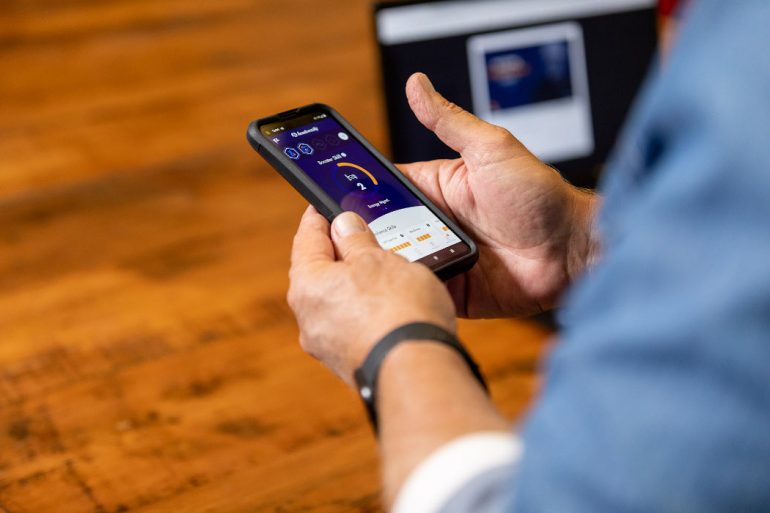Headversity has secured $12.5 million CAD ($10 million USD) in Series A financing to fuel the growth of its workforce training software across the United States (US).
Headversity saw its client base grow by 250 percent in 2021, amid rising demand for mental health services during COVID-19.
The Calgary-based startup provides mental health training to employees at firms like Shell, First Group America, and OMERS, and has seen a year of significant growth. Headversity has seen its client base grow by 250 percent in 2021 alone, amid rising demand for mental health services during COVID-19, which has placed added stress on workers. Since March 2020, Headversity claims its revenue has increased by 815 percent.
The startup’s all-equity round was led by New York-based Level Equity, with participation from Saskatoon’s Westcap Management and Calgary’s Birchcliff Partners. The financing brings Headversity’s total funding to about $15.9 million CAD ($12.5 million USD).
Dr. Ryan Todd, Headversity’s co-founder and CEO, told BetaKit that the firm plans to expand the reach of its mental health solution by investing in product development and moving into the US. Headversity hopes the former will move it closer towards its goal of being able to predict and prevent incidents in the workplace.
Founded in 2017, Headversity provides workforce training tools and content through its platform, which is available on mobile, tablet, and desktop. The startup aims to help teams and individual employees upskill their “resilience, behavioural health, and psychological safety.”
The startup’s evidence-based training – which comes in the form of daily practice tools, micro lessons, video and audio lessons, and written articles – focuses on what Headversity refers to as “the six skills of resilience:” mental health, mental fitness, self expertise, hardiness, mindfulness, and energy management.
Todd, a psychiatrist by training, said Headversity was born when he started working with Alberta Health Services, and noticed that prospective patients had to wait “three to six, sometimes nine months” just to see him for an initial assessment.
RELATED: LifeSpeak acquires Torchlight to expand digital education to caregivers
“I started to explore where my patients and people were coming from, and most, if not all, were coming from the workplace,” said Todd. “I wanted to try and reduce that waitlist and get ahead of the issue and not just react to it. That’s literally where the name [Headversity] came from, to get ahead of adversity.”
Since its 2019 launch, the startup claims to have seen an eightfold increase in revenue, and served users in over 22 countries through its app.
During the pandemic, workforce stress levels have risen significantly, according to a 2020 study conducted by The Harris Poll on behalf of the American Psychological Association.
Amid this environment, Headversity claims its tech and approach has helped the startup become a market leader in the industrial sector, “where needs have been acute due to escalating safety incidents throughout the COVID-19 pandemic.”
Steven Gramlich, Headversity’s co-founder and chief marketing officer, told BetaKit that previous mental health support in the workplace “was oriented towards individuals experiencing mental ill-health” through employee assistance program (EAP) resources, teletherapy, and counselors.
RELATED: CloudMD to acquire MindBeacon in a $116 million deal
“The problem is 70% of the workforce have admitted to this being the most stressful moment in their career,” said Gramlich, attributing some of Headversity’s growth during the pandemic to its push for “earlier intervention with tools to proactively build skills.”
According to Todd, Headversity thrives in “blue-collar industries” where it serves clients that include construction companies. “Those are groups that need to create psychological safety in their workplaces and are really motivated to do so, and also physical safety through upscaling resilience skills,” he added.
Todd acknowledged that there is a lot of competition amongst Canada’s direct-consumer mental health apps. The sector features companies like Montréal-based Dialogue and Toronto-based firms like Maple, Felix Health, and MindBeacon, which is set to be acquired by CloudMD.
According to the CEO, part of what sets Headversity apart is its focus on organizations. “We work exclusively with organizations, and our unique offering, in terms of how we roll out solo training and team training [and] can report data back to individuals and organizations, has really helped us be a differentiator and scale aggressively,” he said.
Gramlich said that Headversity has seen “a lot of success” to date serving industrial organizations in Canada’s energy, construction, transportation, and utilities sectors. “Our focus is on carving out market share in key [US] states that resemble these industries,” said Gramlich, identifying Texas, Pennsylvania, and Ohio as initial targets for expansion.
RELATED: LifeSpeak goes public on TSX, closes $125 million public offering
Todd said Headversity was attracted to Level Equity as an investor given the VC firm’s ability to help the startup scale and expand across the US. Headversity intends to double its current headcount by adding 40 to 50 new employees by the end of 2022.
In addition to Headversity, Canada’s workplace wellness tech space also features players like Maple, which serves individuals and employees; Dialogue, which focuses on organizations; and Toronto-based LifeSpeak, which provides digital mental health and well-being education software to firms ranging from Fortune 500 companies to government agencies, and insurance providers.
Like Headversity, LifeSpeak, Dialogue, and Maple saw growth during COVID-19 amid increased demand for virtual health and wellness solutions.
Gramlich argues that part of what differentiates Headversity from other players in the employee wellness and mental health tech space is its micro-learning based approach and focus on skill measurement and development.
“Overall, our product is more of an experiential skill-building play, whereas LifeSpeak is more conceptual and is a massive content library,” said Gramlich. “It’s a big difference in user experience as ours is focused on offering utility in the flow of the workday, whereas players like LifeSpeak take a different learning approach that is more geared around consuming a ton of content.”
With files from Charles Mandel.
Feature image courtesy of Headversity


